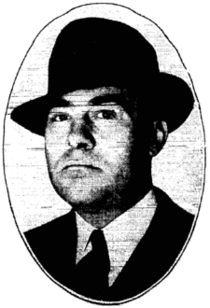Edwin Atherton
Edwin Newton Atherton (October 12, 1896 – August 31, 1944) served as a Foreign Service Officer, Bureau of Investigation (BOI) Agent, Private Investigator, and later, appointed head of the college athletics organization, the Pacific Coast Conference in 1940.[1][2]
Edwin Atherton | |
|---|---|
 San Francisco Chronicle, 1937 | |
| Born | October 12, 1896 |
| Died | August 31, 1944 (aged 47) |
| Resting place | Forest Lawn Memorial Park Glendale, California |
| Alma mater | Georgetown University (1914) |
| Occupation | FBI Agent Private investigator Commissioner, Pacific Coast Conference (1940–1944) |
Born in Washington, D.C., Atherton studied law at Georgetown University (1914) for only four months. After leaving Georgetown, he was a clerk in a bank and then entered the consular service (January 1916) where during World War I he served in Italy, Bulgaria, and Jerusalem. After the war, Atherton served in Canada, then resigned from consular duties (March 13, 1925 and served the Department of Justice from 1925 to 1927. He served in New York, Boston, Detroit, Los Angeles and headed the Department of Justice office in San Francisco, California.[3]
His service in the BOI (later FBI) was notable for his having worked on the 1924 capture of a neo-revolutionary army of Mexican nationals under the leadership of General Enrique Estrada at Engineer Springs on the California border. He resigned from the BOI in 1927 and started a private investigating firm in Los Angeles with another former special agent, Joseph Dunn, called Atherton and Dunn.
Atherton's firm was hired to investigate police graft and corruption and wrote the so-called "Atherton Report" on police corruption in the San Francisco Police Department in the late 1930s.[4]
He was paid $40,000 to thoroughly investigate the Pacific Coast Conference in 1938.[5] After two years and the submission of his extensive two-million-word report,[6] he was immediately appointed to be High COmmissioner of the Pacific Coast Conference in January 1940 to carry out his recommended reforms.[1]
Death
After a month-long hospitalization for a gall bladder illness in August 1944, Atherton died at age 47 at Santa Monica Hospital in Santa Monica, California.[2][7]
Personal
Atherton was survived by his widow, Anzonetta Atherton, whom he had married in October 1942. He was previously married to Elma Atherton, who divorced him in October 1941.[8]
References
- "Coast colleges name Atherton boss". Spokesman-Review. Associated Press. January 6, 1940. p. 10.
- "Edwin Atherton, Coast football czar, dies". Berkeley Daily Gazette. United Press. September 1, 1944. p. 11.
- FBI information on Enrique Estrada capture Archived 2016-12-25 at the Wayback Machine
- 1937 Atherton Report
- "Faults of P.C.C. are listed". San Jose News. United Press. January 5, 1940. p. 10.
- "Atherton Report, $40,000 worth, calls a spade a spade for colleges". Spokesman-Review. Associated Press. January 4, 1940. p. 13.
- "Coast czar Atherton dies". Eugene Register-Guard. United Press. September 1, 1944. p. 8.
- "Commissioner of football dies in south". San Jose News. United Press. September 1, 1944. p. 11.